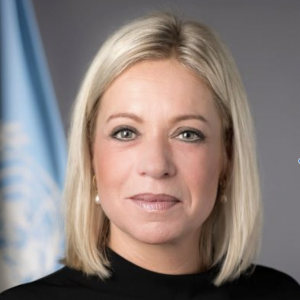Ladies and gentlemen, it is a pleasure to be part of this event today, alongside His Excellency, the Governor of Basra, as well as His Excellency, the Minister of Environment.
The launch of this mangrove nursery shows, once again, that Iraq’s leaders are taking environmental challenges seriously. And frankly, this is no less than what is needed.
By the end of 2022, 68,000 people in central and southern Iraq had been driven from their homes by drought. Alongside the impact on the agricultural sector, which is making food insecurity a reality for too many people, sandstorms and other extreme weather events, fueled by desertification, are - by now - part and parcel of the new normal.
Though, as I said at the Basra Climate Conference organized by Prime Minister Mohammed Shia al-Sudani in March, we must avoid being drawn into a crescendo of doom. Fear can breed paralysis – which is the last thing we need. And so, I think this new nursery, supported by the World Food Programme in collaboration with key government and academic stakeholders, provides an excellent opening for a renewed focus on opportunities.
“Mitigation” and “adaptation” – we use these terms when we talk about climate change, but what do they actually mean?
Well, behind them lie real change; behind them lie concrete chances for improvement in the daily lives of people – particularly those who are most vulnerable.
What would this change look like? Of course, it could translate into heightened resilience, making the impact of the challenges I just mentioned less severe.
Or, and perhaps even better, it could mean the creation of new growth and opportunities. For example, if the Government can access the voluntary carbon credit market to finance some of its climate change programmes, this would free up resources for improvements in other areas. Or, indeed, a new, green economy, which includes investment in renewable energy, can, in and of itself, generate employment and spur economic growth. Either way, mitigation and adaptation are not negatives. Quite the opposite. When done strategically, they add up to a net gain.
And, partnerships that pool the resources and skills of different entities – federal and local government bodies, the UN and other international partners, businesses and NGOs – are the way forward. So yes, I very much hope to see a scale up of such collaboration as Iraq’s Government makes its ambitious climate plans a reality, particularly in this decade of action on the Sustainable Development Goals and in the run-up to COP28 in the United Arab Emirates in November.
Now - in speaking of such partnerships, let me turn back to the reason we are all here today.
This new mangrove nursery should produce 1 million seedlings per year. That will mean, we hope, the planting of 5 million mangrove trees by 2028.
These trees will help in sequestering carbon, promoting marine diversity and – again, speaking about new opportunities – boosting ecotourism and food security.
Within this context, let me acknowledge the role of Basra University, as well as the Ministry of Environment, which, with WFP through funding from the Government of Germany, have made this project a reality.
And, if you allow me, I would also like to take a moment to highlight the efforts of so many vibrant, active groups and communities. Just take, for example, the volunteers who will be planting the mangrove trees today. In giving their time and energy, these young people are playing a direct role in protecting the future of generations to come.
To conclude, ladies and gentlemen, there is no denying it: climate change is one of the biggest global challenges. And, here in Iraq, people are already feeling the effects of living under its shadow.
But, looking around us today – surrounded by the people who are leading the charge against climate change, reaffirming the success that is born from our collaboration – I believe we can also feel hopeful about what lies ahead.
Thank you.




